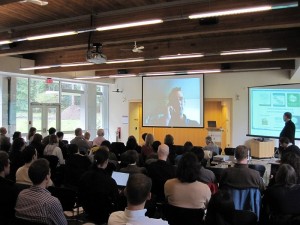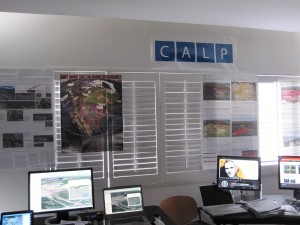Last week, the Social Mobilisation for Climate Solutions Research Workshop took place at the Peter Wall Institute at the University of British Columbia. The workshop started with the “Changing Perceptions of Climate Change through Community Action” public sessions by Rob Hopkins (Transition Network), Elke Weber (Columbia University) and Stephen Sheppard (University of British Columbia). The event can be watched as webcast recording at http://www.socialmobilisation.pwias.ubc.ca.
After a number of workshop sessions, the series closed with a demo session, sponsored by GRAND. The DIGITAL MEDIA DEMO SESSION featured tools from leading local developers and academics who are advancing digital tools to communicate and mobilize meaningful action on issues of environmental sustainability and climate change.
Demo stations and presenters included:
- Petr Cizek: Social mobilisation and visualization work on the oil sands oilsandstruth.org
- Nick Sinkewicz: 3D visualization of the CIRS building
- Jon Salter: Interface design and usability studies for 3d landscape visualization
- Steve Bohus: Visualization of scenarios in a 3d game engine www.lakeviewresidents.com
- Ryan Nadel: Precipice – Interactive Simulation of climate change futures
ryannadel.com/2009/12/16/precipice-interactive-simulation - Olaf Schroth: 3D visualization of climate change mitigation and adaptation scenarios in GoogleEarth for Kimberley, BC
www.lviz.org/?p=231 - Ocean Summit – fisheries management visualization – Sherman Lai, Villy Christensen, UBC
www.lenfestoceanfutures.org - West House – sustainable laneway home – Lynn Bartrum
westhouse.sfu.ca - Children’s tangible games – Alissa Antel, SFU
www.antle.iat.sfu.ca/TangibleSpatialGames/index.html - MetroQuest – scenario exploration for regional futures – Mike Walsh, Dave Biggs
www.metroquest.com - Carbon Chaos – iPhone game for transit-oriented carbon reduction – Dave Marhal
carbonchaos.ca - Pulse – real-time energy intelligence for buildings – David Helliwell
www.pulseenergy.com - Social Signal – ‘Power the Games’ BC Hydro Facebook app – Rob Cottingam
apps.facebook.com/powerthegames - Mobile muse – community-oriented mobile content and service – David Vogt
www.mobilemuse.ca - Augmented Reality – Spacial Interface Research Lab – Nick Hedley
http://spatialinterfaceresearchlab.org/index.html



